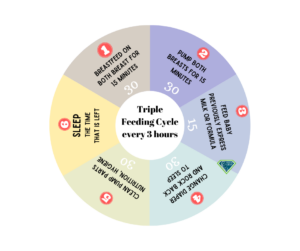“Are you breastfeeding or formula feeding?” I cringed as I overheard a complete stranger asking my husband this question while we were shopping for baby clothes. “Formula,” my husband replied. “I can’t believe she asked you that!” I exclaimed as she walked away. “How is that any of her business?” He shrugged and replied, “maybe she’s pregnant and is trying to figure out if she should breastfeed.” “It’s still none of her business,” I said. “If she had asked me, I would have said we’re breastfeeding.”
Yes, that’s right, I would have lied to a random woman because I was afraid she would judge me. Despite my anger at this stranger, however, I wasn’t necessarily worried about what she thought of me; it was about what I thought of me. I felt guilty about formula feeding.
It wasn’t that I didn’t try to breastfeed. It just happened that my nursing journey didn’t exactly work out the way I’d planned, and not a day goes by that I don’t feel bad or like I somehow failed my son for my inability to breastfeed.
New moms are faced with a barrage of breastfeeding materials and recommendations. The baby books tout the benefits of breastfeeding, and the hospitals march lactation specialists into your room to show you proper breastfeeding techniques and how to pump. I took the prenatal breastfeeding class the hospital offered and followed all of the directions from the lactation consultants. We were never told during our breastfeeding classes, nor was it mentioned in any of breastfeeding books, that it may not work out… and more importantly, that you’re not a complete failure if you can’t breastfeed.
The lactation consultants in the hospital informed us that he might not be able to transfer any milk from me because he had a ‘slight’ tongue-tie and early on my supply was very low. To attempt to stimulate my milk supply, the lactation consultants encouraged me to start pumping the day after he was born. Since he wasn’t latching properly and couldn’t transfer the tiny amount of colostrum I had his blood sugar plummeted, and the medical staff in the hospital advised us to supplement with formula. “It’s only temporary,” I thought. “We’ll get this all worked out exactly as I planned.”
When we left the hospital, however, things did not look up in the breastfeeding department. The pediatrician advised me to “triple-feed” and have my son latch on both sides to stimulate the hormones for milk production, and then have my husband bottle feed him while I pumped. We did this every three hours, and honestly, the three of us were miserable; my baby cried and screamed when I would try to get him to latch. I was experiencing postpartum anxiety and feared that I could not take care of my son or be the mother I needed to be.
And of course, all this stress and anxiety didn’t help my milk supply. I couldn’t sleep because my brain was clouded with thoughts that I would somehow hurt my baby because I couldn’t breastfeed, that something would go wrong because I couldn’t give him the nourishment he needed. I would dread feeding time because it was just a constant reminder of my inability to produce for my son and my self-inflicted feelings of inadequacy.

Sleep deprivation has very serious consequences. As health professionals, we need to protect maternal mental health when developing complicated breastfeeding plans. Very serious sleep deprivation conditions while triple feeding has resulted in postpartum depression, anxiety, psychosis, deteriorating physical health, and serious accidents.
In those first few weeks, I was unable to comfort my baby when he cried because I couldn’t hold him without trembling from nerves and anxiety. I immediately thought this meant I was a bad mom and didn’t have the “mom instinct” I heard so much about while I was pregnant. When I was beside myself with anxiety and fear, I remember feeling like I was just a burden to my family. If my husband could just give our son a bottle, it would be easier for him if I wasn’t around, and then he wouldn’t have a baby plus an erratic, emotional wife to take care of. I told Drew this one night between my shaking and uncontrollable sobs
He hugged me and told me, “Your son needs you, and I do, too. I can’t do this without you and I wouldn’t want to. We will get through this.”
I read countless books and articles about breastfeeding and was convinced I was doing my baby a disservice if I chose not to breastfeed. We had a consultation to potentially reverse the tongue tie, but even the ENT told us it was minor and may not be necessary.
My husband was right there in the trenches with me, trying to make breastfeeding work because he knew it was important to me. But he also stressed the importance of taking care of myself, and knew I couldn’t be the best mom and partner when I was riddled with depression, anxiety, fear, and constant thoughts of inadequacy. He sat and listened patiently and empathetically through countless tear-filled conversations.
“This is our decision, it’s not up to anyone else,” he told me. Even with his support, however, I told him if we ended up going full formula, I didn’t want anyone to know. “We’ll just say I’m pumping and bottle feeding,” I told him with tears welling up in my eyes.
Despite my reservations, we decided to exclusively formula feed. We put the breast pump and all its pieces in storage. Looking at it was a constant reminder of what I’d perceived to be my personal failure—but we made our decision and we were sticking to it.
Although part of me felt like I simply gave up on my son, my anxiety instantly lessened when I stopped pumping and being constantly angry at myself for my low milk supply. The trouble I had comforting my baby vanished. I was more calm and confident. It seemed like I instinctively knew what to do to take care of my son, when just a few days before I had felt lost and hopeless. My sense of humor came back, and I enjoyed my time with my baby versus feeling like I couldn’t provide for him. I could actually smile, make jokes, and admire my beautiful little boy. I still felt uneasy about the decision, but I also felt more emotionally and mentally available for my family.

We’re all just doing the best we can. Your best may look different from someone else’s, but that doesn’t give us the right to pass judgment or lecture anyone else for their decisions or parenting style. We are women, which means by nature we’re too hard on ourselves. If you’re a mom and you’re anything like me, you’re constantly raking yourself over the coals and your own mom-guilt is worse than anything that could come from another mom.
While the love for our little ones seems to come so naturally, let us not forget to love each other, and most importantly, to love ourselves.
Who knows what my son will grow up to be, but what I do know is this: I couldn’t feed him the way I wanted to, but that doesn’t mean I can’t give him an unlimited supply of unconditional love, kisses, cuddles, support, and life lessons. I couldn’t be the food supply he needed, but I will do everything in my power to be the mom he deserves.

To my son: I may not have been able to give you my milk, but you always have my whole heart and all of my love. ~MT
The Fed Is Best Foundation will always be my voice. They speak for so many families by listening without any judgment or shame and I am grateful.
Maternal Mental Health Feels Like it Comes Second to Breastfeeding When It Should Be First
Clinicians’ Guide to Supporting Parents with Guilt About Breastfeeding Challenges
I Shared My Story a Year Ago And I Was Told To Go Kill Myself – How I Am Healing


2 thoughts on “Fed Is Best- And I’m Fed Up!”